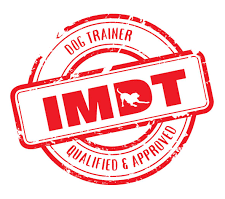Here at Royvon, we are passionate about our residential training programme and the benefits it can bring for you and your dog. If your pooch has behavioural issues such as anxiety and aggression, it can be the perfect thing to help them. Or, if they need training but you’re tight on time, we can train them and deliver them back to you with the skills they need to build on this and do further work at home! In fact, we believe that our residential training option works well for all sorts of situations. However, many people ask us about what happens once the three-week residential dog training programme is finished. Of course, we don’t just leave you to it! We work with each and every owner to help them make the most of their dog’s new skills, and carry on the vital training at home.
Today, we’ll be using the case study of Poppy and the advice that we’ve given her owner after her training with us, in order to show you what you can expect after a residential training stay with us. Poppy is a cocker spaniel who came to us for general obedience training, as well as to improve her behaviour when walking on and off the lead. Our trainer Charlie absolutely loved working with her to improve her skills. She is a highly food motivated dog, so Charlie used treats as a reward for positive behaviour to encourage Poppy to learn. But what needs to happen now so that she can retain these vital skills and learn new ones? Once a dog like Poppy finishes their residential training stay, it’s time to go home and transfer the skills she has learnt to her owners to help everyone keep up the good habits and improve even further on their training journey. So, let’s take a closer look at what happens next:
The basics
Firstly, we always recommend that owners repeatedly watch the training videos supplied to them, and take note of the exercises and environments week by week. Of course, it’s very exciting to be reunited with your dog, and owners are always eager to try out their new skills in all sorts of fun places! However, we recommend that it’s actually more beneficial to start afresh, as though the dog is a puppy again. This means starting in environments with minimal distractions, and working your way up to environments that are more stimulating and distracting. Doing this helps to solidify the training and also offer an amazing way to bond with your dog after their time away. The videos offer a useful guide in how to achieve the behaviours you want, so think about the tone of voice, timing, and body language used.
Week One
In the first week of having your dog back home, there are a few steps that we recommend you follow to help get them used to being back at home and their new training regime! As an example, here’s the advice we gave to Poppy’s family:
- Have an amazing time welcoming your dog back home and enjoy each other’s company. Play together, spend time together and relax together. Your pup will probably be very excited to be home and back with the family, so spend a few days settling her in and getting her back into routine.
- Apply good behaviour into her everyday routine. For example, ask for sits, downs, wait for eye contact or just general calm behaviour (not being impatient, not barking or jumping) in order for Poppy to gain access to things she wants such as play, toys, food, going through doors and attention. Understanding that those simple behaviours will allow her to have all the things she loves will increase the chance that she will repeat those behaviours. Reward the behaviours you want to see. When she is relaxed and takes herself to bed, or sees a bird but doesn’t bark, treat her with food or calming praise and strokes. Show her that good things happen when she acts in a way that we want.
- Go through the basics such as: loose walking exercise in the garden, drive way, and down the road; sit and recall games; stays; down in different rooms of the house and the garden; performing these skills with different family members; and around set up distractions. Practicing these behaviours in controlled environments, and gradually increasing distractions and challenges, helps prepare her to perform the correct behaviours in different situations.
- Introduce suitable enrichment to help Poppy feel satisfied and content. This tends to equal a calm and relaxed dog. We recommend using a portion of her daily food for training exercises, the rest can be scattered in the garden, arranged in a trail for her to follow or used in a snuffle mat or food toys. Encouraging her to sniff, forage or work for her food is a more natural and stimulating way for her to eat. Sniffing for all dogs is a favoured pastime, especially for breeds like spaniels that are renowned for their amazing sense of smell. So, introducing activities that will allow her to use her nose will be incredibly rewarding for her. Sniffing also takes up a lot of brain power so it is great for helping dogs like Poppy to relax.
- Management is crucial to training. Moving too quickly or skipping steps can allow for unwanted behaviours to occur. For example, using a long lead in new or exciting places or at the beginning of walks. Instead, work on dropping it on the floor, finally unclipping it for short periods and then building up the duration of off lead time. This minimises the opportunity for her to run away to explore without you and gets her into the habit of sticking close by.
Week 2 and 3
Once your dog has been home with you for a little longer, you can begin to increase and change up things such as distractions and rewards. Let’s take a closer look at the suggestions we gave to Poppy’s owners to demonstrate this:
- Slowly increase the distance and duration of wanted behaviours, and increase distractions such as a family member jogging past while she sits or stays in down or as someone slowly plays with one of her toys; increase the eye contact duration when loose lead walking etc. However, we don’t want to set her up to fail, so make things harder at a pace she is capable of to increase her confidence and tolerance.
- Practice obedience skills like sits, down and stay in different environments. This could include the pavement, parks, dog friendly shops, the high street. Play recall games on and off the lead in different parks, green spaces and wooded areas.
- Mix up the treat / reward ratio. In the first few days it can pay to be generous with rewards so we can clearly mark the behaviours we want to see. However, to avoid over using food we want to slowly decrease the amount but still keep her interested. I think that using a combination of a varying ratio to keep her guessing as well as rewarding food for especially good behaviours (for example when she is quick, responsive or performed around a new distraction) and only using praise for a behaviour that occurred slowly or with less focus is a good mix to introduce.
- Keep calm and stay persistent! We have to be clear about what we want from our dogs and what behaviours we do or do not want. It’s important to be consistent but also fair. If our dogs are tired, distracted or over stimulated they may not be able to perform their best. So, take a break, try again or go back a few steps to help Poppy understand what you want.
- Use what she loves to reinforce good behaviours further. Spend time experimenting with different play, toys and games so you can use this to gain focus or use as a reward for good behaviour. This could be: stroking her in a certain spot, a football, tug or lure toys, verbal praise, squeaky toys, feather toys etc. Use her own food, small biscuits to scatter, hide or throw for Poppy to chase and small pieces of meat treats as high value rewards for distracting areas or for good behaviour without being asked. Food is so valuable to dogs and using their opportunistic nature to our advantage makes learning much faster and aids in good behaviours becoming more natural and ingrained as she matures.
Other top tips once your dog is home from their residential dog training programme
Here are a few more tips that we often give owners after their dog has finished their training session with us!
- Keep training short and sweet, around 2-4 minutes, or take a certain amount of small treats and stop when you run out or choose to end the session. You can gradually increase the duration of sessions, but we want to avoid frustration and boredom. Keep training achievable and interesting, ending on a high note sooner rather than later. Games and activity after learning can help provide a stimulating reward and can improve long term memory of the practiced behaviour.
- Split your dog’s walks into segments. Sometimes we want to have focus and loose lead walking, and sometimes we want to allow her time to sniff, go to the toilet and do her own thing. This can be difficult for energetic dogs like Poppy but giving her lots of opportunities to do so will encourage her to do it more often. We also want to spend periods engaging in play with toys, recall games, and chasing, so she chooses to stick around and helps keep her interested in us despite the environment. Constant play and stimulation can build up too much excitement. So, having a balance of focus, games and relaxation time can help teach our dogs that walks don’t have to be adrenaline filled all the time.
- Do things differently, visit local parks, use local roads to practice loose lead walking and gradually increase the distraction level, a walk to town, river walks, heaths ect. Mix up your routines so things don’t become predictable!
Training is a journey, we want to continuously improve our dogs’ behaviour and widen their learning experiences as much as possible throughout their life. Adolescence is always a tricky time, but patience, consistency and kindness will help nurture a strong bond and mutually beneficial relationship.
Poppy’s Training Video
To give you a better idea about the sort of exercises we work with your dog on during their residential training programme, watch this video of her with trainer Charlie in action!
Conclusion
As you can see, here at Royvon we are dedicated to supporting owners even after their dog’s residential training programme with us is over and they are back home. That’s why we offer owner training sessions and other forms of support in the weeks after your dog returns home to you. While it is, of course, important for your dog to learn their skills, their behaviour will only continue to improve if their owners are dedicated to learning and training as well. And, we are here to support you every step of the way to make sure that you and your dog can make the most out of your training experience!
To find out more about our residential training programmes, please click here.





Leave A Comment